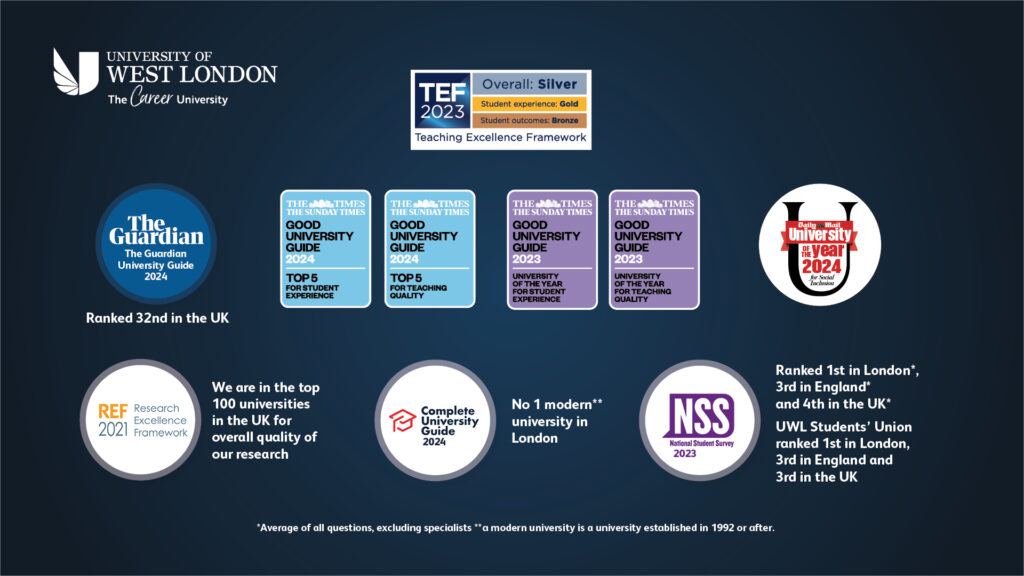UWL MSc.
Digital Marketing
(12 Months FT/24 Months PT)

Course Objectives
Each module contains the latest content relevant to present-day practice within the digital marketing industry and embeds key skills required for digital marketing practitioners, such as management skills for marketing professionals and research methods in marketing.
This dynamic course has a very strong focus on integrated learning, where the teaching and assessments will simulate real-life marketing situations with industry client-inspired digital marketing projects, to prepare students to pursue a successful career in digital marketing.
Course Overview
Throughout this course, you will learn how to effectively analyse, communicate and operate in competitive local and global contexts, preparing you to be a highly successful digital marketing professional within a rapidly evolving industry.
Through a series of specifically designed, practical hands-on workshops, expert guest speakers, simulations, and industry “live briefs”, we provide:
– a modern approach to the teaching of digital concepts, from a broad range of avenues including strategic marketing, leadership, e-commerce, consumer behaviour, social media marketing and designing new paths to purchase on innovative digital platforms
– a thorough curriculum aimed at the optimal utilisation of digital tools, to enhance data analysing and research skills, along with providing insights to improve marketing performance
– hands-on practical learning through modern assessments and industry-inspired projects
– the opportunity to develop and further enhance skills like creative problem solving, innovative thinking, and the ability to work independently and as a team to formulate ideas and opinions that drive effective marketing proposals and add value to any global organisation or marketing team
– knowledge of how the digital customer experience is integral to marketing
– well-structured and carefully curated course content to enhance different levels of understanding and learning styles.
CIM Accreditation
The Chartered Institute of Marketing (CIM) has approved this degree for exemptions on CIM qualifications. UWL has developed strong links with CIM and our teaching content has been developed alongside CIM’s learning outcomes to ensure that course content is aligned to industry requirements.
Facts and achievements
- University of the Year for Student Experience and University of the Year for Teaching Qualityin The Times and Sunday Times Good University Guide 2023
- Number 32 out of 121 universities nationwide in The Guardian University Guide 2024.
- Ranked 1st in London, 3rd in England and 4th in the UK in the National Student Survey 2023*.
- University of the Year for Social Inclusion in the Daily Mail University Guide 2024
- Employability – Our career-focused courses will allow to immerse yourself in your chosen career before you even graduate.
- Diversity – We have one of the most diverse student populations in the country.
*Average of all questions, excluding Specialists
Strategic Partners
- Guest Lecturing
- Material to students/lecturers
- Awards for Top-Performing students
- Internship Opportunities
- MBA Consulting Projects




FULL TIME (Start September or February)
Term 11. Global Brand Management and Leadership
2. Strategic Marketing and Psychology in a Digital Era
3. Digital Tools
Term 2
4. Digital Retail Environments – New Paths to Purchase
5. Content Marketing and Campaign Management
6. Innovation, Creativity and Digital Futures
Term 3
7. Digital Marketing Consultancy Project**
OR
Digital Marketing Dissertation**
PART TIME (Start September or February)
Term 11. Global Brand Management and Leadership
2. Strategic Marketing and Psychology in a Digital Era
Term 2
3. Content Marketing and Campaign Management
4. Digital Tools
Term 3
5. Innovation, Creativity and Digital Futures
6. Digital Retail Environments – New Paths to Purchase
Term 4
7. Digital Marketing Consultancy Project**
OR
Digital Marketing Dissertation**
Module Aims
Compulsory:
You will learn how to adopt a strategic approach to branding and communication in a global digital context, defining the concepts of brand architecture, brand growth to measurements of brand equity and evaluating brand performance.
This module aims to create a productive discourse on contemporary marketing challenges and
future digital marketing trends and their impact
on marketing, industry, consumers and the
environment. You will gain the knowledge and
skills required to develop and provide an industrystandard,
consultative approach to defining and
delivering effective marketing projects.
Through this module, you will also gain a valuable
portfolio of marketing and research skills which
would enable you to critically reflect on the role
and responsibilities of contemporary marketers,
develop effective marketing proposals and gain
an in-depth understanding of conducting research
in marketing.
The module comprehensively presents concepts and theories of evolving consumer behaviour and new paths to purchase in the digital retail environment. It illustrates the dimensions of social psychology and its relationship to brands and branding, and also the way in which an emotional attachment with a brand influences the decisionmaking process.
You will assess the way in which digital channels provide marketers with unique opportunities to improve the effectiveness of campaigns through continuous testing, analysis and optimisation throughout the module with a blend of theoretical models and hands-on practice.
The rapid expansion of creative content, posted by consumers, influencers to global companies via social media digital channels, (i.e. Instagram, YouTube, Facebook, TikTok, LinkedIn, Twitter etc) combined with the use of mobile devices, broadband and Wi-Fi, has brought added complexity to the work of marketing strategists and planners.
Understanding consumer contexts and leveraging defining customer preferences have become critical parts of the decision-making process in order for marketers to deliver engaging content for marketing campaigns. Through this module, you will be able to gain an in-depth understanding of data-driven marketing and explore effective campaign development and management.
It would also enable you to further develop strategic thinking, planning, creative, and research skills.
Through this module, you will also gain a range of valuable skills including project management, innovation and collaboration and research skills, which will enable you to explore a marketing idea through analysing the market and develop the concept for a minimum viable product along with a product/service launch marketing proposal.
Optional:
Through this module, you will be able to gain practical experience and apply and develop a range of skills including analytical, communication, project management, consultancy, research and other transferable skills. The module also enables you to apply the knowledge and skills gained from previous modules on this course to solve a real business problem or explore a real business opportunity, and in doing so, you will be able to reflect on your personal learning journey, gaining vital experience as a digital marketer and also making a valuable contribution to the business.
Please note, the MSc course will be taught over 12 months, however, students who wish to do the Digital Marketing Consultancy Project but are unable to find a Consultancy Project during the summer (due to the seasonal nature of the demand for digital marketing consultancy projects), can attempt the module during the following September semester, or do the Digital Marketing Dissertation instead.
In doing so, you will also be able to make a useful contribution to the existing academic and professional knowledge base.
The associated substantive documentation will, in addition to describing the theoretical and practical aspects of the project, demonstrate the effective and efficient application of the research methods taught in the particular topic of the project undertaken.
Assessment
Global Brand Management and Leadership
Written Assignment 40%,
Artefact 20%,
Oral Assignment 40%
Strategic Marketing and Psychology in a Digital
Era
Oral Assignment 20%,
Artefact 30%,
Written Assignment 50%
Digital Retail Environments – New Paths to
Purchase
Written Assignment 50%,
Written Assignment 50%
Digital Tools
Oral Assignment 50%,
Written Assignment 50%
Content Marketing and Campaign Management
Written Assignment 20%,
Artefact 50%,
Oral Assignment 30%
Innovation, Creativity and Digital Futures
Written Assignment 50%,
Oral Assignment 50%
Digital Marketing Consultancy Project
Written Assignment 10%,
Written Assignment 50%,
Oral Assignment 40%
Digital Marketing Dissertation
Written Assignment 10%,
Written Assignment 90%

Admission Requirements
- An honours degree (2:2 or above) from a UK
university or equivalent, or a Chartered Business
School of Marketing (CIM) Professional Diploma.
- UWL also considers applications from those
who do not have a formal qualification but have
extensive marketing experience. In this case,
the applicant would be invited to interview and
maybe required to undertake a short-written
paper in order to assess their suitability for the
academic demands of the course. All applications
are considered on an individual basis.
- English competency e.g. IELTS 6.0, GCSE C OR equivalent qualification

Duration
(12 months FT/24 months PT)

Accreditation
Recognised by UK NARIC and KYSATS

